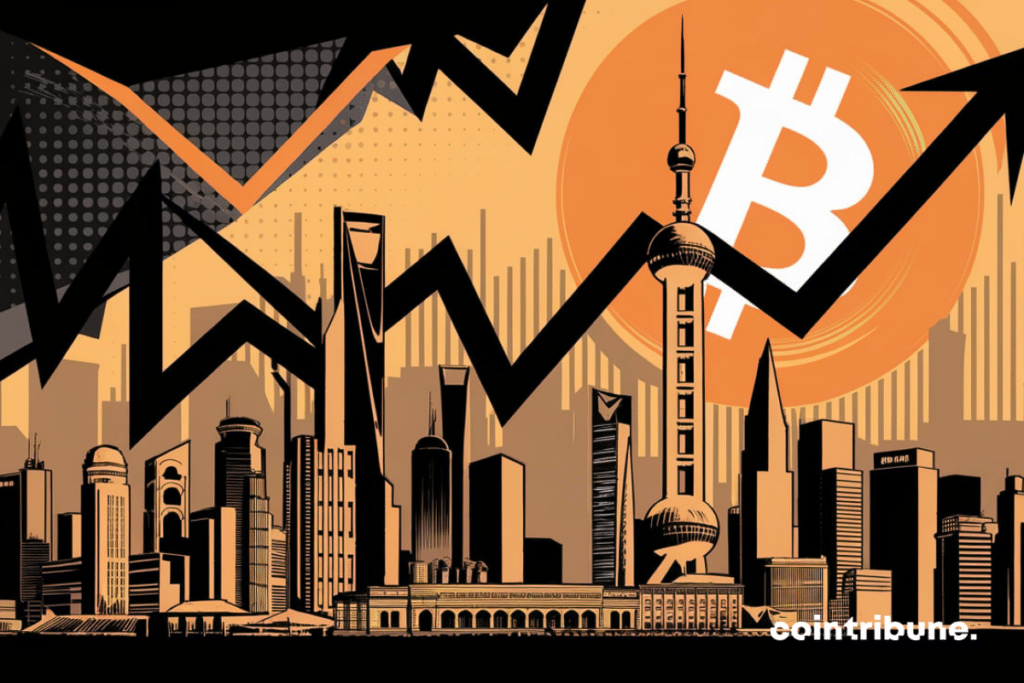20:00 ▪
6
min reading ▪ acc
After the ECB and the Fed, it is China’s central bank’s turn to honestly loosen its monetary policy. What impact on the stock market and bitcoin?

The PboC is imitating the Fed
China’s central bank reacted quickly after the Fed cut its key rate by 0.50% to 4.75%.
The People’s Bank of China responded by cutting its key interest rate by 0.20% from 1.7% to 1.5%. This is twice the usual decline of 0.10%. This is the sixth decline since March 2020, when the rate was 2.4%.
In particular, the PboC has reduced the reserve requirement ratio, which has returned to its lowest level since 2018. It is clear that banks will be able to create more money ex nihilo relative to their reserves.
It is the first time since 2015 that reductions in these two monetary parameters have been announced at the same time.
As a result, the yield on 10-year Chinese government bonds fell to 2%, an all-time low. The US government borrows at 3.70% and France at 2.90%.
This monetary easing should allow China to issue at least 10 trillion yuan ($1.42 trillion) of very long-term government bonds. Compare that to the government’s annual budget of $4 trillion.
The loans will be made over the next two years, said Liu Shijin, former deputy director of the Development Research Center of the State Council, China’s top executive.
China can afford it. In fact, inflation has been almost non-existent for over a year. Conversely, it remains to be seen whether Western monetary easing will revive inflation…
China’s stock market is rising
Chinese stock markets have been languishing for years, burdened by the risk of Western sanctions and the real estate crisis.
However, it is important to distinguish the current situation from the US financial crisis of 2008. The problems were mainly focused on real estate developers rather than the late payment of individuals. China’s banking system was not shaken.
The fact remains that China’s stock markets have lost the equivalent of $6 trillion in capitalization over nearly four years. The Shanghai stock market fell 7% ahead of the PboC announcement.
After declines of -10%, -8% and -15% in the Hang Seng, Shanghai Composite and Shenzhen Component at the start of the year, we are now at +14%, -2% and -9%.
Here is the performance of the index of the fifty largest Chinese companies since September 11:
This rebound is due to the fact that investment funds and insurance companies will be able to draw on PboC funds to buy shares. We are talking about 800 billion yuan ($113 billion).
Enough to prop up valuations that are teetering on 10-year lows. The Shanghai Stock Exchange’s price-to-earnings ratio is at its lowest since late 2014. Chinese stocks are 31% undervalued, according to Morningstar.
Is it enough to attract capital from petro-monarchies and other nations that want to limit their exposure to Western countries? The specter of freezing $300 billion of Russia’s foreign exchange reserves remains alive…
That being said, caution will be in order as long as geopolitical tensions remain this high. Threats of killer tariffs from Donald Trump will fuel uncertainty.
Monetary easing is good for Bitcoin
Exchanges are of course prohibited in China. It is not possible to go to a site like Coinbase or Binance and buy bitcoins. You must meet in person. Hong Kong’s ‘clandestine’ bitcoin sales are on the rise.
These murderous laws have slowed Bitcoin adoption, and China is ranked 20th in the world by Chainalysis, which is not the country’s custom. According to a 2024 report, South Korea bought as many Bitcoins as China despite having a population 33 times smaller.
The launch of Bitcoin ETFs in Hong Kong suggests that things are slowly moving in the right direction. But so far, the Chinese government has little appetite for what it sees as speculation and a way around its capital controls.
Unfortunately, the Xi Jinping government still refuses to see Bitcoin as another international reserve currency. It clings to gold even though Bitcoin is far superior in every way.
Perhaps things will change when China further opens up its capital markets so that it is not excluded from European and American markets.
Meanwhile, monetary easing in all four corners of the world is a testament to asset prices, and Bitcoin in particular. Don’t miss our article: Bitcoin – four pillars of the next Bull Run.
Maximize your Cointribune experience with our “Read and Earn” program! Earn points for every article you read and get access to exclusive rewards. Register now and start reaping the benefits.
Report on Bitcoin, “Goddess of wisdom, feeding on the fire of truth, exponentially smarter, faster and stronger behind a wall of encrypted energy”.
DISCLAIMER OF LIABILITY
The comments and opinions expressed in this article are solely those of the author and should not be considered investment advice. Before making any investment decision, do your own research.

